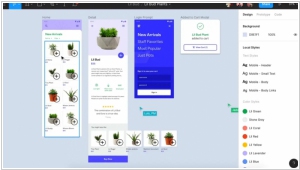Figma vs InVision
September 19, 2023 | Author: Adam Levine
10
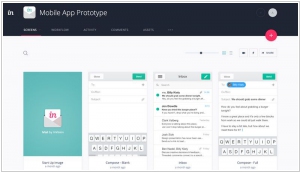
InVision lets you transform your designs into beautiful, interactive web & mobile mockups and prototypes. Upload your designs and quickly turn them into clickable, interactive prototypes complete with gestures, transitions & animations. Send a link to open designs in a browser or on a mobile device, or present them in real-time using our LiveShare presentation tool that revolutionises the design meeting.
Figma and InVision are two popular design and prototyping tools that serve different purposes within the design workflow. Figma is a cloud-based design tool that allows teams to collaborate in real-time on design projects. It offers a robust set of features for creating vector graphics, designing interfaces, and creating interactive prototypes. Figma's strength lies in its ability to facilitate seamless collaboration, allowing designers, developers, and stakeholders to work together efficiently. On the other hand, InVision is primarily focused on interactive prototyping and user experience design. It allows designers to create clickable prototypes with advanced transitions and animations, making it ideal for presenting and testing interactive designs. InVision also offers additional features like user testing, project management, and design system management.
See also: Top 10 Online Design software
See also: Top 10 Online Design software
Figma vs InVision in our news:
2023. Adobe and Figma end $20B acquisition plans after regulatory headwinds in Europe
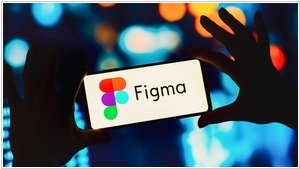
Adobe's $20 billion acquisition of rival Figma has officially collapsed, as the companies cited regulatory challenges in Europe as the decisive factor leading to the abandonment of the deal. Initially revealed in September of the previous year, the significant size of the transaction and the elimination of one of Adobe's key competitors made it susceptible to regulatory scrutiny. Throughout 2023, the U.S. Department of Justice (DOJ) closely examined the deal, although no formal lawsuit had been filed to prevent its completion. In a final effort to avoid legal action, Adobe and Figma engaged in discussions with the DOJ before the weekend, ultimately resulting in the termination of the acquisition plans.
2022. Adobe snaps up Figma for $20B
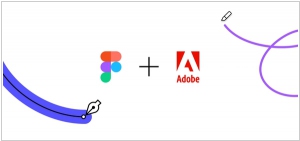
Adobe has recently announced its acquisition of Figma for a staggering $20 billion. Figma has gained popularity among individuals and teams due to its streamlined and modern cloud-based environment for design and prototyping. With approximately 4 million users to date, Figma has established itself as a prominent player in the industry. On the other hand, Adobe has been actively expanding its presence in the digital creation space through both internal developments and acquisitions. This expansion has taken Adobe beyond design and into marketing and other interconnected areas in the creation process. Design has always been at the core of Adobe's DNA, evident in their iconic products such as Photoshop, fonts, illustration, video, and 3D tools. The strategic vision behind the acquisition is to seamlessly integrate these Adobe products with Figma, positioning Figma as the native platform that unifies all of them. Adobe already had a similar offering in the form of AdobeXD, but the acquisition of Figma further strengthens its position in the design ecosystem.
2021. Figma introduces a whiteboard tool called FigJam
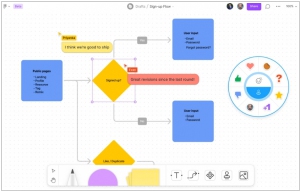
Figma, the online collaborative design service, has unveiled FigJam, a new whiteboarding tool aimed at fostering teamwork. FigJam goes beyond providing designers with a space to generate ideas collectively; it also enables nondesigners to actively participate in the brainstorming process. The tool offers a range of features, including sticky notes, emojis, drawing tools, shapes, pre-built lines and connectors, stamps, and cursor chats. Integration with Figma ensures smooth transitions as components or design objects created in FigJam can easily be transferred to Figma. Additionally, Figma is introducing voice chat functionality across all its products. This allows users collaborating on designs in Figma or engaging in brainstorming sessions in FigJam to communicate via audio without the need for separate Zoom or Google Meet calls—simply toggling on chat in Figma facilitates seamless audio communication.
2020. InVision refreshes its Design System Manager
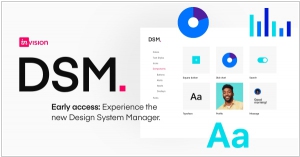
InVision, the design service, is introducing an innovative Design System Manager that provides teams with enhanced flexibility and control over the creation and maintenance of their design system. The updated features include the capability to import reusable design elements in bulk and directly upload native Sketch libraries to the InVision DSM. This empowers design system owners to effortlessly create and manage their libraries in Sketch and seamlessly transition them to InVision. Additionally, the new DSM enables one-click updates for all libraries during a company's rebranding process, eliminating the need to individually delete and replace each design asset. Instead, the entire design system can be updated simultaneously.
2020. Design platform Figma raises $50 million
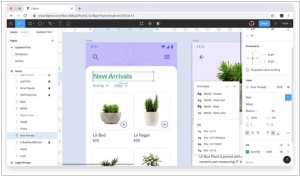
Figma, the design platform renowned for its collaborative and cloud-based approach, has recently concluded a successful Series D financing round, raising $50 million. After nearly six years of development in stealth mode, Figma was launched in 2015 with the vision of creating a collaborative design tool that functions similarly to Google Docs. Since its inception, Figma has continued to enhance its platform, focusing on expanding accessibility and usability for individual designers, small firms, and large enterprise companies. Additionally, the company introduced an educational platform called Community, empowering designers to share their work and enabling users to "remix" designs or explore them layer by layer.
2019. InVision acquired design file versioning startup Trunk

Online design software provider InVision has completed the acquisition of Trunk, an Australia-based company exclusively dedicated to file versioning for designers. While GitHub has revolutionized version control for developers, allowing them to track changes, experiment with separate branches, and collaborate seamlessly by merging branches, designers have not been granted the same level of convenience. Typically, designers find themselves spending a significant amount of time searching through lengthy email chains in pursuit of the latest attachment version. The Trunk team will now concentrate their efforts on Studio, InVision's design tool, which was introduced approximately a year ago. With the launch of Studio, InVision showcased its ambition to transcend being a mere collaboration tool and aspire to become the design world's equivalent of Salesforce.
2019. Online design tool Figma gets new enterprise collaboration features
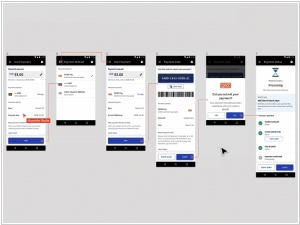
Figma, the web-based design and prototyping tool aiming to provide an alternative to similar tools like Adobe, is introducing a range of new features today to enhance collaboration across teams within large organizations. Known as Figma Organization, this feature set represents the company's first enterprise-grade service, incorporating controls and security tools that are essential for large companies. One notable addition for designers is the introduction of organization-wide design systems. While Figma already offered tools for creating design systems, this enterprise version simplifies the process of sharing libraries and fonts among teams. This ensures consistent application of styles across a company's products and services.
2018. Prototyping tool InVision is valued at $1.9 billion
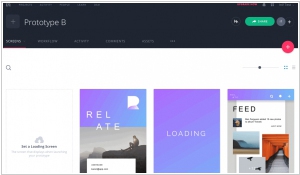
InVision, the design startup aspiring to become the Salesforce of the design industry, has officially reached unicorn status by successfully closing a $115 million Series F funding round. This latest investment brings the company's total funding to $350 million and values InVision at $1.9 billion. InVision initially emerged in 2011 as a straightforward prototyping tool, allowing designers to create interactive experiences without requiring direct involvement from the engineering team. These prototypes could then be shared with various teams, including engineering, product, marketing, and executives, for collaboration and approval. Over the years, InVision has expanded its scope to cover the entire design process, offering a comprehensive collaboration suite called InVision Cloud, enabling the involvement of every team member in the design process. Additionally, they introduced Studio, a design platform aimed at competing with industry giants like Adobe and Sketch. InVision also developed the InVision Design System Manager, a centralized solution for design teams to manage their assets and implement best practices effectively from a single location.
2018. InVision deepens integrations with Atlassian
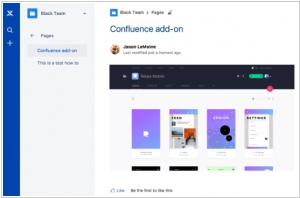
InVision has enhanced its integration with Atlassian products including Confluence, Trello, and Jira, enabling users to conveniently view and share InVision prototypes directly from within these applications. This integration acknowledges the collaborative nature of design and development teams that frequently utilize both InVision and Atlassian products. With this expanded integration, designers now have the ability to share their InVision Studio designs and prototypes seamlessly within Jira, Trello, and Confluence. InVision Studio, introduced in the previous year, presents designers with a compelling alternative to Sketch and Adobe.
2018. Design tool InVision gets an app store
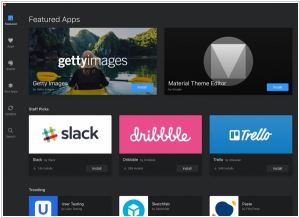
InVision, the platform aspiring to serve as the operating system for designers, has introduced an app store and asset store within InVision Studio. This means that users of InVision Studio can now conveniently access their frequently used apps and services directly from within the design tool. Additionally, these users will have the ability to explore and acquire icons, UX/UI components, typefaces, and other resources within Studio itself. Although Studio is still in its early stages, InVision has established a strong lineup of initial app store partners, including Google, Salesforce, Slack, Getty, Atlassian, and more.

